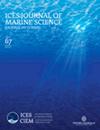Assessing the influence of offshore wind turbine noise on seasonal fish chorusing
IF 3.4
2区 农林科学
Q1 FISHERIES
引用次数: 0
Abstract
Offshore wind farms have recently emerged as a renewable energy solution. However, the long-term impacts of wind turbine noise on fish chorusing phenology are largely unknown. We deployed a hydrophone 10 m from a foremost turbine in Taiwan situated at the Miaoli offshore wind farm (Taiwan Strait) for two years to investigate sound levels and assess the potential influence of turbine noise on seasonal fish chorusing patterns during 2017 and 2018. Wind turbine noise (measured in the 20–250 Hz frequency band) was significantly higher in autumn and winter (mean SPL: 138–143 dB re 1 μPa) and was highly correlated with wind speed (r = 0.76, P < 0.001). During both years, fish chorusing exhibited a consistent trend, that is, beginning in spring, peaking in summer, decreasing in autumn, and absent in winter. Our results show the noise from a single turbine during the two-year monitoring period did not influence the seasonal fish chorusing (r = −0.17, P ≈ 1). Since the offshore wind farm installations are growing in magnitude and capacity across the Taiwan Strait, this study for the first time provides baseline operational sound levels and an understanding of the fish seasonal vocalization behavior at the foremost turbine of the first wind farm in Taiwan. The results presented here provide useful insights for policymakers and constitute a reference starting point for advancing knowledge on the possible effects of wind turbines on fish chorusing in the studied area.评估近海风力涡轮机噪声对季节性鱼类鸣唱的影响
近来,海上风电场已成为一种可再生能源解决方案。然而,风力涡轮机噪声对鱼类鸣唱表型的长期影响在很大程度上是未知的。在 2017 年和 2018 年期间,我们在距离台湾苗栗近海风力发电场(台湾海峡)最前沿涡轮机 10 米处部署了一个水听器,连续两年调查声级并评估涡轮机噪声对季节性鱼类鸣唱模式的潜在影响。风力涡轮机噪声(在 20-250 Hz 频段测量)在秋季和冬季明显较高(平均声压级:138-143 dB re 1 μPa),并且与风速高度相关(r = 0.76,P < 0.001)。在这两年中,鱼类鸣叫呈现出一致的趋势,即春季开始,夏季达到高峰,秋季下降,冬季消失。我们的结果表明,在两年的监测期内,单台涡轮机的噪声并不影响鱼类的季节性鸣叫(r = -0.17,P ≈ 1)。由于台湾海峡两岸海上风电场的规模和容量都在不断扩大,本研究首次提供了基线运行声级,并了解了台湾首个风电场最前端涡轮机的鱼类季节性发声行为。本文介绍的结果为政策制定者提供了有用的见解,并为进一步了解风力涡轮机对研究区域鱼类鸣声可能产生的影响提供了参考起点。
本文章由计算机程序翻译,如有差异,请以英文原文为准。
求助全文
约1分钟内获得全文
求助全文
来源期刊

ICES Journal of Marine Science
农林科学-海洋学
CiteScore
6.60
自引率
12.10%
发文量
207
审稿时长
6-16 weeks
期刊介绍:
The ICES Journal of Marine Science publishes original articles, opinion essays (“Food for Thought”), visions for the future (“Quo Vadimus”), and critical reviews that contribute to our scientific understanding of marine systems and the impact of human activities on them. The Journal also serves as a foundation for scientific advice across the broad spectrum of management and conservation issues related to the marine environment. Oceanography (e.g. productivity-determining processes), marine habitats, living resources, and related topics constitute the key elements of papers considered for publication. This includes economic, social, and public administration studies to the extent that they are directly related to management of the seas and are of general interest to marine scientists. Integrated studies that bridge gaps between traditional disciplines are particularly welcome.
 求助内容:
求助内容: 应助结果提醒方式:
应助结果提醒方式:


